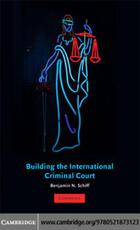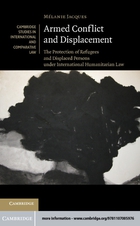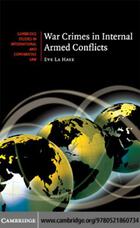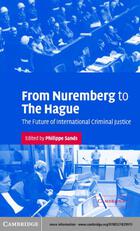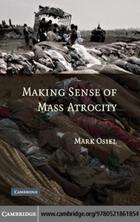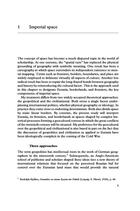Browse Titles - 8 results
Building the International Criminal Court
written by Benjamin N. Schiff, 1952- (Cambridge, England: Cambridge University Press, 2008), 322 page(s)
The International Criminal Court (ICC) is the first and only standing international court capable of prosecuting genocide, war crimes, and crimes against humanity. This book analyzes the ICC, melding historical perspective, international relations theories, and observers' insights to explain the Court's origins, c...
Sample
written by Benjamin N. Schiff, 1952- (Cambridge, England: Cambridge University Press, 2008), 322 page(s)
Description
The International Criminal Court (ICC) is the first and only standing international court capable of prosecuting genocide, war crimes, and crimes against humanity. This book analyzes the ICC, melding historical perspective, international relations theories, and observers' insights to explain the Court's origins, creation, innovations, dynamics, and operational challenges.
Field of Study
World History
Content Type
Book
Author / Creator
Benjamin N. Schiff, 1952-
Date Published / Released
2008
Publisher
Cambridge University Press
Topic / Theme
General Context: Human Rights Violations, War Crimes, Crimes against Humanity, Genocide, War crimes, International laws, International justice, History, Law, Origins, Transitional Justice, 21st Century in World History (2001– ), 20th Century in World History (1914--2000)
Copyright Message
Copyright © 2008 Cambridge University Press
×
Cambridge Studies in International and Comparative Law, Armed Conflict and Displacement: The Protection of Refugees and Displaced Persons un...
written by Mélanie Jacques, fl. 2008; edited by John S. Bell, fl. 2007 and James Crawford, fl. 2007, in Cambridge Studies in International and Comparative Law (New York, NY: Cambridge University Press, 2012, originally published 2012), 296 page(s)
The issue of the protection of refugees and displaced persons caught up in war has rarely been examined from the standpoint of international humanitarian law. This study not only addresses the topical issue of displacement in war, but also analyses the international humanitarian law regime and its shortcomings.
Sample
written by Mélanie Jacques, fl. 2008; edited by John S. Bell, fl. 2007 and James Crawford, fl. 2007, in Cambridge Studies in International and Comparative Law (New York, NY: Cambridge University Press, 2012, originally published 2012), 296 page(s)
Description
The issue of the protection of refugees and displaced persons caught up in war has rarely been examined from the standpoint of international humanitarian law. This study not only addresses the topical issue of displacement in war, but also analyses the international humanitarian law regime and its shortcomings.
Field of Study
Global Issues
Content Type
Book
Contributor
John S. Bell, fl. 2007, James Crawford, fl. 2007
Author / Creator
Mélanie Jacques, fl. 2008
Date Published / Released
2012
Publisher
Cambridge University Press
Series
Cambridge Studies in International and Comparative Law
Topic / Theme
Border Events and Areas Context, War, Human rights, International laws, Refugees, Law, 21st Century in World History (2001– ), 20th Century in World History (1914--2000)
Copyright Message
Copyright © 2012 Cambridge University Press
×
Cambridge Studies in International and Comparative Law, War Crimes in Internal Armed Conflicts
written by Eve La Haye, fl. 2008, in Cambridge Studies in International and Comparative Law (Cambridge, England: Cambridge University Press, 2008), 446 page(s)
Does international law make individuals responsible for perpetrating war crimes during civil wars? If so, how can that responsibility be enforced? Eve La Haye discusses the feasibility of national and international prosecutions and the means to bring to justice those who have committed such crimes.
Sample
written by Eve La Haye, fl. 2008, in Cambridge Studies in International and Comparative Law (Cambridge, England: Cambridge University Press, 2008), 446 page(s)
Description
Does international law make individuals responsible for perpetrating war crimes during civil wars? If so, how can that responsibility be enforced? Eve La Haye discusses the feasibility of national and international prosecutions and the means to bring to justice those who have committed such crimes.
Field of Study
World History
Content Type
Book
Author / Creator
Eve La Haye, fl. 2008
Date Published / Released
2008
Publisher
Cambridge University Press
Series
Cambridge Studies in International and Comparative Law
Topic / Theme
General Context: Human Rights Violations, War Crimes, Crimes against Humanity, Genocide, International laws, War crimes, War crimes tribunals, Civil war, History, Law, Transitional Justice, Origins, 21st Century in World History (2001– ), 20th Century in World History (1914--2000)
Copyright Message
Copyright © Eve La Haye 2008
×
From Nuremberg to The Hague: The Future of International Criminal Justice
edited by Philippe Sands, 1960- (Cambridge, England: Cambridge University Press, 2003), 208 page(s)
Based on five lectures organized jointly by Matrix Chambers and the Wiener Library in London between April and June 2002. Leading experts examine the evolution of international criminal justice from World War II through to today. An intelligent and thought-provoking book, accessible to specialists and non-speciali...
Sample
edited by Philippe Sands, 1960- (Cambridge, England: Cambridge University Press, 2003), 208 page(s)
Description
Based on five lectures organized jointly by Matrix Chambers and the Wiener Library in London between April and June 2002. Leading experts examine the evolution of international criminal justice from World War II through to today. An intelligent and thought-provoking book, accessible to specialists and non-specialists alike.
Field of Study
World History
Content Type
Book
Contributor
Philippe Sands, 1960-
Date Published / Released
2003
Publisher
Cambridge University Press
Topic / Theme
General Context: Human Rights Violations, War Crimes, Crimes against Humanity, Genocide, War crimes tribunals, War crimes, International laws, History, Law, Transitional Justice, Origins, 21st Century in World History (2001– ), 20th Century in World History (1914--2000)
Copyright Message
Copyright © Wiener Library 2003
×
Genocide in International Law: The Crime of Crimes (Second Edition)
written by William A. Schabas, fl. 2004 (Cambridge, England: Cambridge University Press, 2009, originally published 2000), 761 page(s)
This second edition of the authoritative guide to the interpretation and application of genocide in international law reviews the drafting and interpretation of the 1948 Genocide Convention and considers the definition of genocide, forms of commission of the crime, defences to charges of genocide and responsibilit...
Sample
written by William A. Schabas, fl. 2004 (Cambridge, England: Cambridge University Press, 2009, originally published 2000), 761 page(s)
Description
This second edition of the authoritative guide to the interpretation and application of genocide in international law reviews the drafting and interpretation of the 1948 Genocide Convention and considers the definition of genocide, forms of commission of the crime, defences to charges of genocide and responsibilities in terms of extradition.
Field of Study
World History
Content Type
Book
Author / Creator
William A. Schabas, fl. 2004
Date Published / Released
2000, 2009
Publisher
Cambridge University Press
Topic / Theme
General Context: Human Rights Violations, War Crimes, Crimes against Humanity, Genocide, International laws, International justice, Genocide, Genocide Convention, 1948, History, Law, Origins, Transitional Justice, 21st Century in World History (2001– ), 20th Century in World History (1914--2000)
Copyright Message
Copyright © 2009 Cambridge University Press
×
Making Sense of Mass Atrocity
written by Mark Osiel, fl. 2004 (Cambridge, England: Cambridge University Press, 2009), 277 page(s)
Responsibility for mass atrocity is always shared, yet criminal law prefers to blame particular individuals for isolated acts. Is such law, therefore, constitutionally unable to make any sense of the most catastrophic conflagrations of our time? Drawing on the experience of several prosecutions, this book, trencha...
Sample
written by Mark Osiel, fl. 2004 (Cambridge, England: Cambridge University Press, 2009), 277 page(s)
Description
Responsibility for mass atrocity is always shared, yet criminal law prefers to blame particular individuals for isolated acts. Is such law, therefore, constitutionally unable to make any sense of the most catastrophic conflagrations of our time? Drawing on the experience of several prosecutions, this book, trenchantly diagnoses the law's limits.
Field of Study
Global Issues
Content Type
Book
Author / Creator
Mark Osiel, fl. 2004
Date Published / Released
2009
Publisher
Cambridge University Press
Topic / Theme
General Context: Human Rights Violations, War Crimes, Crimes against Humanity, Genocide, War crimes tribunals, Atrocities, International laws, International justice, History, Law, Origins, Transitional Justice, 21st Century in World History (2001– ), 20th Century in World History (1914--2000)
Copyright Message
Copyright © Mark J. Osiel 2009
×
The Struggle for the Eurasian Borderlands: From the Rise of Early Modern Empires to the End of the First World War
written by Alfred J. Rieber, 1931- (Cambridge, England: Cambridge University Press, 2014, originally published 2014), 652 page(s)
This book explores the Eurasian borderlands as contested “shatter zones” which have generated some of the world’s most significant conflicts. Analyzing the struggles of the Habsburg, Russian, Ottoman,
Iranian, and Qing empires, Alfred J. Rieber surveys the period from the rise of the great multicultural, con...
Sample
written by Alfred J. Rieber, 1931- (Cambridge, England: Cambridge University Press, 2014, originally published 2014), 652 page(s)
Description
This book explores the Eurasian borderlands as contested “shatter zones” which have generated some of the world’s most significant conflicts. Analyzing the struggles of the Habsburg, Russian, Ottoman,
Iranian, and Qing empires, Alfred J. Rieber surveys the period from the rise of the great multicultural, conquest empires in the late medieval/early modern period to their collapse in the early twentieth century. He
charts how these empires ex...
This book explores the Eurasian borderlands as contested “shatter zones” which have generated some of the world’s most significant conflicts. Analyzing the struggles of the Habsburg, Russian, Ottoman,
Iranian, and Qing empires, Alfred J. Rieber surveys the period from the rise of the great multicultural, conquest empires in the late medieval/early modern period to their collapse in the early twentieth century. He
charts how these empires expanded along moving, military frontiers,competing with one another in war, diplomacy, and cultural practices, while the subjugated peoples of the borderlands strove to maintain
their cultures and to defend their autonomy. The gradual and fragmentary adaptation of Western constitutional ideas, military reforms, cultural practices, and economic penetration began to undermine these ruling ideologies and institutions, leading to the collapse of all five empires in revolution and war within little more than a decade
between 1911 and 1923.
Show more
Show less
Field of Study
World History
Content Type
Book
Author / Creator
Alfred J. Rieber, 1931-
Date Published / Released
2014
Publisher
Cambridge University Press
Topic / Theme
EU and its Borders, Internal and External, War, International relations, Diplomacy, Political boundaries, Cultural identity, Cultural assimilation, Imperialism, History, Law, Geography, Politics & Policy, Asians, Europeans, Early Modern Period (1450–1750), Industrialization and Western Global Hegemony (1750–1914), Post-Classical Period (500–1450)
Copyright Message
Copyright © 2014 Alfred J. Rieber
×
Writing History in International Criminal Trials
written by Richard Ashby Wilson, 1953- (Cambridge, England: Cambridge University Press, 2011), 273 page(s)
Why do international criminal tribunals write histories of the origins and causes of armed conflicts? Richard Ashby Wilson conducted empirical research with judges, prosecutors, defense attorneys and expert witnesses in three international criminal tribunals to understand how law and history are combined in the co...
Sample
written by Richard Ashby Wilson, 1953- (Cambridge, England: Cambridge University Press, 2011), 273 page(s)
Description
Why do international criminal tribunals write histories of the origins and causes of armed conflicts? Richard Ashby Wilson conducted empirical research with judges, prosecutors, defense attorneys and expert witnesses in three international criminal tribunals to understand how law and history are combined in the courtroom.
Field of Study
Global Issues
Content Type
Book
Author / Creator
Richard Ashby Wilson, 1953-
Date Published / Released
2011
Publisher
Cambridge University Press
Topic / Theme
General Context: Human Rights Violations, War Crimes, Crimes against Humanity, Genocide, War crimes tribunals, War crimes, Yugoslav War Crimes Trials, Hague, Netherlands, 1994-, Yugoslav Wars, 1992-1995, Post Genocide Rwanda, 1994-, Rwandan Civil War and Genocide, April 7–July 15, 1994, History, Law, Transitional Justice, Serbians, Bosnians, Tutsi, Hutu, 21st Century in World History (2001– ),...
General Context: Human Rights Violations, War Crimes, Crimes against Humanity, Genocide, War crimes tribunals, War crimes, Yugoslav War Crimes Trials, Hague, Netherlands, 1994-, Yugoslav Wars, 1992-1995, Post Genocide Rwanda, 1994-, Rwandan Civil War and Genocide, April 7–July 15, 1994, History, Law, Transitional Justice, Serbians, Bosnians, Tutsi, Hutu, 21st Century in World History (2001– ), 20th Century in World History (1914--2000)
Show more
Show less
Copyright Message
Copyright © Richard Ashby Wilson 2011
×

